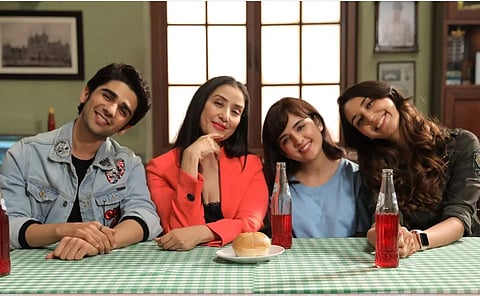Maska Movie Review: An interesting premise somehow manages to yield disastrous results
Rating:(1.5 / 5)
Given its deceptively interesting beginnings, you’d never guess how low Maska would go on to fall. The conflict is straightforward and one milked for decades in our cinema. A loving mother, Diana Irani (Manisha Koirala), wants her son to run her family restaurant, Rustom Café. The son, Rumi Irani (Prit Kamani), wants, however, to chase his passion: Become an actor. Not bad at all, right? I thought so too, but in hindsight, I should have heeded some early warnings more seriously. Manisha Koirala, for instance, delivers an OTT performance (pun intended) that seems out of place in this universe. Her character, Diana, gets diagnosed with arthritis, but she knows she has a bigger problem to contend with: Her son’s rebellion. She says, and I’m not making this up, “I have son-thritis.” Another character makes the overused ‘jeans-genes’ wordplay. Around this time, Rumi begins interacting with an apparition of his dead father, Rustom Irani (Javed Jaffrey). The former complains: “Dad, I have no identity.” The latter retorts, “You have no Aadhaar card?” Suddenly, Coronavirus didn’t seem that bad.
Director: Neeraj Udhwani
Cast: Manisha Koirala, Javed Jaffrey, Nikita Dutta, Shirley Setia, Prit Kamani
And yet, I still harboured hopes. The conflict rises to a crescendo around the one-hour mark, despite the mediocre performances and music. Will Rumi sell his café, his family legacy, to fund his pipedream? Somehow, the makers conspire to kill this tension by bringing in a love triangle, which I suppose, was always on the cards. This phase sinks Maska beyond redemption. Both actors, Prit Kamani and Shirley Setia (who plays Rumi’s neighbourhood friend, Persis), deliver wooden performances that show little evidence of internalisation of their characters and their motivations. Rumi has decided to sell off his café for money, but when he’s told heartwarming anecdotes of people who love his café, he betrays no guilt. He reacts with the genial smile of a stranger. When Persis gets forcibly written into a situation where she has to share the bizarre anecdote of her dead brother to a half-awake Rumi, it leaves you fighting a laugh, not a tear. The situations, the performances, all seem manufactured. In theory, the idea of a dying old man wanting to share a ‘bun maska’ with his wife, may have seemed moving, but when you see how it plays out, it’s just bizarre. All I could think was, how did you get this content past Netflix?
There’s more painful wordplay when Persis talks of a time when she was too drunk and says she was under “beer pressure”. Rumi’s dead father peeps at him urinating, and asks if he had a ‘good shake’. In more serious problems, a character cheats on his girlfriend and doesn’t ever bother confessing or asking for forgiveness. Instead, he dumps her, and wonders why she won’t immediately accept his hug. But then, Maska is the sort of series that makes her accept it anyway. The last half hour, especially, feels interminable. If I had to cut this content some slack, I suppose I could say that the film’s point—that the romanticised notion of chasing one’s passion doesn’t always bear good results—is interesting. It’s trying to say that some people have a real talent for areas thought to be ‘mundane’. Rumi’s phone cover reads, “Destined for Greatness, Stuck in Mundaneness’. The idea is interesting, but the execution yields disastrous results. There’s a scene in the beginning when Rumi performs—strike that—overacts in a play. Some acquaintances of his appreciate him. Meanwhile, the chief guest, Boman Irani (in a cameo), looks physically uncomfortable at the sheer mediocrity of what’s passing for a play. He has a pained expression on his face that suggests that while he’s in pain, he’s unfortunately not in a position where he can stop watching mid-way either. It summarised my response to Maska.
(The film is currently streaming on Netflix)

